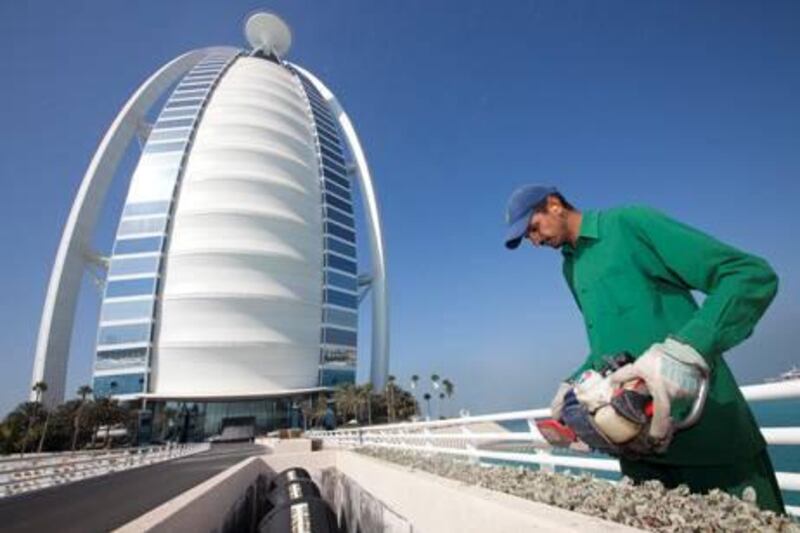Jumeirah Group, a hospitality company based in Dubai, is cutting jobs despite ambitious international expansion plans.
The news came as the group, which counts the Dh6,600 (US$1,796) a night Burj Al Arab among its portfolio of properties, lost two of its key management contracts in the emirate.
The group had been running the Meydan hotel at the multi billion-dollar racecourse of the same name as well as the luxurious Bab Al Shams desert resort.
Now both properties have been taken over by the developer Meydan. Jumeirah, which is part of Dubai Holding, also manages the Jumeirah Beach Hotel as well hotels in New York and London.
"Jumeirah Group is reorganising its corporate structure to be better aligned with changing market dynamics," the company said. "In view of its international expansion, Jumeirah is putting in place a regional structure, which unfortunately involves a number of job losses in group and corporate positions."
Layoffs were also made across the board last year, including hotel positions such as chefs, as well as among senior sales, marketing and development.
The cuts seem to be at odds with Jumeirah's rapidly growing portfolio of hotels planned internationally, which include more than 35 hotels and resorts in locations such as Argentina, Thailand, Morocco and China.
"On the one hand they're expanding and on the other they are getting leaner," said Harjinder Singh, a hotel consultant at CB Richard Ellis.
"They are probably cutting down on their costs as much as they can to increase profitability. They might be looking at hiring other people from the other regions where they want to expand. It's a corporate cut-down. There could be multiple reasons for this."
Gerald Lawless, the executive chairman of Jumeirah Group, last year said rates and occupancy levels were recovering at its hotels in Dubai. Last month the group announced it was taking over the management of the Jumeirah Zabeel Saray resort on the Palm Jumeirah, which opened last week.
"We anticipate that a number of employees affected by this reorganisation will find suitable positions in Jumeirah's new hotels opening in Dubai, Jumeirah Zabeel Saray, [in] Abu Dhabi, Jumeirah Etihad Towers, [and in] the Maldives and Germany. The changes will not affect guest-facing services within our hotel operations," the company said.
The luxury operator Banyan Tree, based in Singapore, was originally intended to manage the Meydan hotel, but ended up in a dispute with the developer and Jumeirah stepped in to take on the role.
"We can confirm that the day-to-day management of The Meydan Hotel and Bab Al Shams Desert Resort and Spa is back with Meydan as from 1 January 2011," Jumeirah Group said.
Former employees who were made redundant by Jumeirah claim that in the past job losses ran into the hundreds.
The group has management agreements signed with various developers, but in the past four years none of those hotels have opened, after the industry was hit by deteriorating financing conditions and the global downturn.
This week, Jumeirah announced plans to manage a luxury resort in Anguilla in the Caribbean and last month revealed plans for hotels in Baku, Azerbaijan, and a sixth property in China.
Dubai Holding, which is restructuring billions of dollars of debt, has been seeking to trim costs and raise cash to service upcoming debt repayment deadlines. It had intended to sell shares in its Axiom Telecom unit to the public, but the planned initial public offering was abandoned last month.
Mr Lawless said at the time the company would not be sold to help Dubai Holding pay its debts.
"I suspect that Jumeirah are also taking the opportunity to review what the corporate team does and deciding that some activities can be eliminated completely, scaled back or transferred to the operational level within their hotels," said Rohit Talwar, the chief executive of the London consultancy Fast Future.
"Jumeirah Group, which has been one of the two main sources of cash generation for Dubai Holding Commercial Operations Group recently, is expected to invest more in domestic refurbishments and international expansion in the near to medium term. These investments make economic sense, but would likely curtail the cash the business can upstream to its parent," said Zafar Nazim, the senior credit analyst for the MENA region at JP Morgan.
* additional reporting by Bradley Hope






